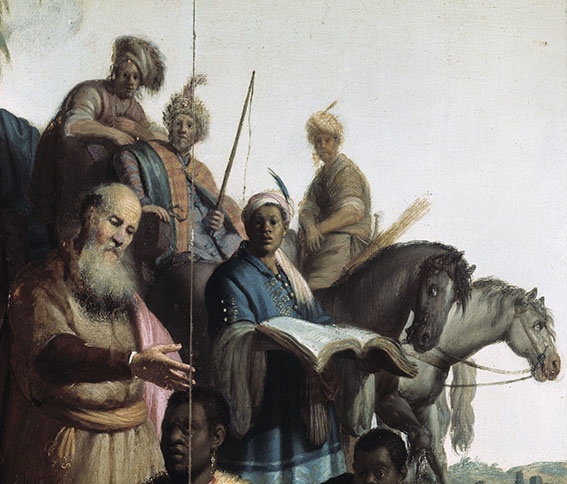When Led by God, He’ll Reveal Our Way Gradually

Have you ever walked down a path that you thought was the best way to go, only to find that you were greatly in error and you should have gone the other way—even though it didn’t seem ‘right’ at that time? Perhaps God pressed on your heart to travel in a direction where there is thick fog and you are unable to see past it. Yet in all other areas, it is mostly clear, or maybe just a little bit dense. Do you keep going where you are led by God? Or do you follow your common sense and go where it is easier to see most of the way?
Philip Was Led by God to Go Into the Desert
In the book of Acts, the Lord told Philip the Evangelist through an angel to “Arise, and go toward the south unto the way that goeth down from Jerusalem unto Gaza, which is desert” (Acts 8:26). Now, to our natural, finite minds this does not seems logical. Why should he go out into the desert? There is nothing there but rocks and sand almost as far as the eye can see. It is not very likely that anyone is out there to visit.
At the same time, right there in Jerusalem, hundreds of people are present almost everywhere at any given moment. It would seem best for him to just stay there, or maybe to go to a nearby village instead. Besides, the shade of the buildings in that area makes it cooler.
When we are led by God, we must go when He directs, even if the road ahead appears impassable, or just a waste of time.
Being Led by God Means Going Forward Even When It Doesn’t Seem Possible
When we walk into an area of thick fog, it hits our eyes at first like a wall. As we move further inward, we can begin to see a little bit more of the walkway. Many times this is how God works in our lives. He reveals our path to us one step at a time. When we walk into an area of thick fog, it hits our eyes at first like a wall. As we move further inward, we can begin to see a little bit more of the walkway. And so, the pattern continues, as we progress even farther into the cloud and our way then becomes somewhat clear again.
Notice how it only becomes clearer after we move to the next area. This is what the Lord wants us to realize. When we are led by God, we must go when He directs, even if the road ahead appears impassable, or just a waste of time. Not until we obey is the subsequent stage made visible to us.

(Public Domain Mark PDM)
Look again at Philip’s predicament and see what occurs. “And he arose and went: and, behold, a man of Ethiopia, an eunuch of great authority under Candace queen of the Ethiopians, who had the charge of all her treasure, and had come to Jerusalem for to worship, was returning, and sitting in his chariot read [Isaiah] the prophet” (Acts 8:27,28). Notice that he ‘arose and went’, meaning that he was obedient to the Lord’s command. As a result, the Lord revealed another section of the way to him.
He, led by God, fully obeyed what the Spirit of God put forth, and, in turn, the Lord opened the way for another step to be revealed.
As Philip Was Led by God, Each Successive Action Was Revealed
“Then the Spirit said unto Philip, Go near, and join thyself to this chariot” (Acts 8:29). If Philip wanted to know what was to come, he first had to obey another directive from the Lord. Of course, he could have just kept on walking, since this person was linked with royalty and he was merely a commoner. After all, it wasn’t proper protocol to just run up and “join thyself to this chariot.” No. He, led by God, fully obeyed what the Spirit of God put forth, and, in turn, the Lord opened the way for another step to be revealed.
“And Philip ran [toward] him, and heard him read the prophet [Isaiah], and said, Understandest thou what thou readest? And he said, How can I, except some man should guide me? And he desired Philip that he would come up and sit with him” (Acts 8:30,31). Whether Philip was royalty or not, this eunuch wanted Philip up beside him to explain God’s word to him.
As a result of Philip being led by God and diligently following His commands, each part of the way was progressively made visible to him. At any point he could have concluded that there was no other way to go and reversed his course. Or he could have kept on moving instead into unsafe territory. Yet, if he had done so, this individual “of great authority under Candace queen of the Ethiopians, who had the charge of all her treasure” would never have known Jesus Christ, never have accepted His plan of salvation, and never have been baptized.

Being Led by God Requires Trust
We are not expected to know the whole picture that God sees in advance. He wants us to trust in Him for each part of the way. It is human nature to want our whole day laid out ahead of time. Most of us would be quite content to know that at a certain time in the morning we will do this thing. Then at a later time, we will do something else. At noon we eat lunch, at five we eat dinner, and then we read some more of our favorite book and go to bed.
We really prefer our life set before us in advance like this, and, of course, we want a little variety randomly distributed here and there throughout each week. As a whole, it is our human desire to know what lies ahead, both immediately, and in the distant future.
Yet doing so would only lead us to a lack of dependence on God. Why should we bother to look to Him, when we already know what each day will bring? This is the reason we need to trust in Him for the next step we are to take. No matter how obscure or odd the way may be ahead of us, if we are led by God to go, we need to move forward.
We, like Philip, need to be led by God through His Spirit to direct us to wherever He wants us to go. It is not necessary to see the whole road ahead in advance.
When Led by God Our Obedience Yields Results
Philip did not know that the treasurer of the Queen of the Ethiopians was out in the desert that day, and he certainly would not have expected that he would reveal Jesus Christ through the book of Isaiah to him. But Philip did obey God, and one more soul was added to God’s Kingdom.

Actually, every step of our walk with the Lord needs to be ordered by Him. We, like Philip, need to be led by God through His Spirit to direct us to wherever He wants us to go. It is not necessary to see the whole road ahead in advance. We very likely will not know who we may reach out to or speak with along the way. Instead of trying to figure out where we are going next, we need to let our eyes be on Him as He progressively reveals each step of the way.
[Additional image credits: Feature image (when applicable) by Jens Johnsson on Pexels; Opening photo by Jason Blackeye on Unsplash]




